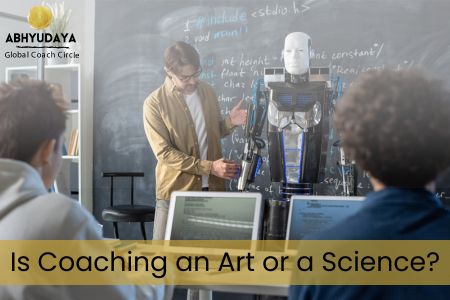Future of Work in India: How the Workplace Is Evolving
The future of work in India is undergoing a seismic transformation. As technology, well-being, and human connection take center stage, India’s workplaces are evolving faster than ever. Artificial intelligence (AI), flexible work models, and the growing coaching culture are shaping how we lead, learn, and thrive in this new era.
Yet, at the heart of this transformation is a timeless truth: people drive progress. Whether in Fortune 500 firms or rising startups, human potential—amplified through coaching and continuous learning—will define India’s growth story in the decade ahead.
The Shifting Nature of Work in India
From bustling hybrid offices to remote startups, Indian professionals are redefining what work means. A growing number of companies are prioritizing purpose-driven work, mental well-being, and learning agility over traditional hierarchies.
According to recent workplace studies, over 90% of Indian organizations expect to expand AI and automation capabilities by 2027—but they also emphasize empathy, adaptability, and creativity as essential skills. The message is clear: the future of work in India will hinge on balancing digital intelligence with emotional depth.
Coaching: The Human Power Behind Change
As work evolves, the coaching industry has emerged as an essential partner in preparing professionals for the future. The International Coaching Federation (ICF)’s 2025 Global Coaching Study—conducted in collaboration with PwC—reveals that the global coaching profession has reached nearly 123,000 practitioners, generating more than $5.3 billion USD in annual revenue. The study highlights booming demand for certified, credentialed, and purpose-driven coaches.
In India, the coaching landscape is following suit. Companies and individuals alike are turning to coaching to:
- Build leadership resilience in uncertain times.
- Foster psychological safety and collaboration in hybrid teams.
- Promote career clarity and skill alignment amidst technological disruption.
Simply put, workplace coaching isn’t a perk anymore—it’s a performance necessity.
ICF’s Vision: Coaching for Humanity and Well-Being
The ICF Thought Leadership Institute, through its Future of Coaching Initiative, emphasizes a wholesome view: coaching in the 21st century will do more than enhance productivity—it will support mental health, collective resilience, and inclusive growth.
Studies from the Institute suggest that tomorrow’s leaders need more than management skills. They need courage, consciousness, and connection. Coaching, powered by futures thinking and ecosystem awareness, helps leaders navigate systemic change while staying grounded in empathy and purpose.
AI may help analyze emotions, monitor mental fatigue, and offer insights—but human coaching will always guide authentic growth and build the trust needed for transformation.
Coaching Trends Redefining the Workplace
1. The Rise of AI-Enabled Coaching
AI is personalizing learning experiences by identifying patterns in behavior and offering real-time feedback. Platforms like CoachHub and Coaching.com combine data analytics with human touch to deliver personalized coaching aligned with employee goals.
2. Coaching for Collective Well-Being
The next decade of coaching won’t just focus on individuals. It will enable teams and communities to rise together—enhancing systemic collaboration, inclusion, and shared purpose.
3. A Demand for Credentials and Trust
According to the ICF study, 73% of clients expect certified coaches. Certification validates expertise and ensures quality, especially when organizations integrate coaching into leadership development frameworks.
4. Expanding Coaching Beyond Corporates
From universities to edtech firms, coaching now extends to education, health, and entrepreneurship. The synergy between academic mentorship and professional coaching is enabling India’s youth to become adaptive, self-driven learners.
Coaching and Career Growth in India
Professionals today are no longer chasing titles—they’re seeking meaning, balance, and psychological safety. Coaching provides a structured framework for self-discovery and alignment with purpose.
In India, many forward-looking organizations use coaching to support DEIB (Diversity, Equity, Inclusion, and Belonging) initiatives—building empathetic teams that thrive on cultural and gender diversity.
Meanwhile, academic coaching institutes are also evolving, adopting mentoring and emotional intelligence frameworks from ICF-certified practices. The academic sector is realizing that preparing students for exams isn’t enough—they need lifelong self-coaching skills to navigate complex, AI-driven futures.
The Hybrid Future: Tech Meets Human Wisdom
The ideal workplace of tomorrow will blend data-driven precision with human wisdom. While AI automates routine tasks, coaching ensures reflection, ethics, and meaning stay intact.
As ICF’s global insights highlight, we’re moving toward a human-AI hybrid coaching model—where algorithms act as thinking partners, not replacements. This partnership allows professionals to better understand emotions, predict burnout, and design sustainable work habits.
India’s Next Frontier: A Coaching Culture for All
India’s demographic advantage—its young, diverse, and motivated workforce—can only be realized fully through a culture of continuous coaching. By embedding coaching mindsets in organizations, schools, and communities, India can unlock leadership potential at scale.
The coming years will demand leaders who are not just skilled, but self-aware and emotionally intelligent. This means investing in ICF-accredited programs, expanding access to coaching in regional languages, and educating organizations about its ROI on productivity and retention.
When coaching becomes part of corporate and educational DNA, India won’t just adapt to the future of work—it will lead it.
Quick Takeaways for Professionals
- Embrace Coaching Skills: Whether you’re a manager, educator, or freelancer, coaching techniques will amplify your influence and impact.
- Invest in Authentic Learning: Seek ICF-accredited programs that build both skills and emotional depth.
- Balance Tech with Touch: AI can give insights, but human guidance fosters purpose.
- Lead with Empathy: People remember how leaders made them feel—coaching helps you lead from that space.
FAQs
- What defines the future of work in India?
It’s a blend of AI-powered automation, human-centered leadership, and lifelong learning opportunities that empower both individuals and teams. - Why is coaching central to this shift?
Coaching bridges technical change with personal growth—helping employees evolve from performing tasks to creating impact. - What role does ICF play in shaping global coaching?
The International Coaching Federation sets global standards, conducts major research through PwC, and certifies professionals to ensure coaching integrity and effectiveness worldwide. - How can individuals benefit from coaching?
Coaching encourages reflection, clarity, and resilience—key traits for thriving amid technological and career transformations. - Is AI replacing coaches?
Not at all. AI supports coaches, but human empathy, context, and intuition remain irreplaceable. The future lies in human-AI collaboration.







